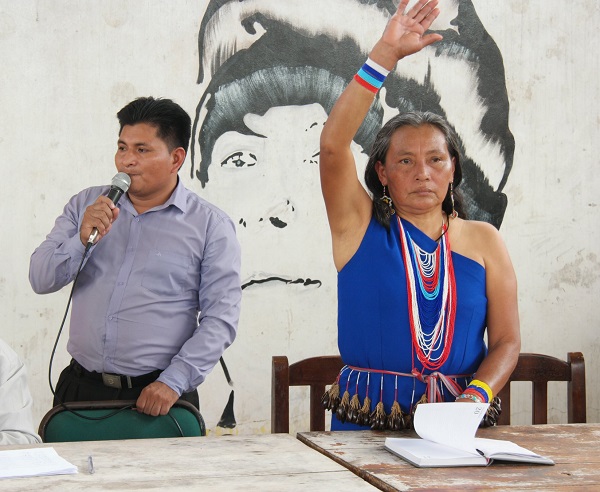First published on 11/22/2019, and last updated on 01/28/2020
By Mencha Barrera and Nicoletta Marinelli from Fundación ALDEA, ICCA Consortium Member.
The Shuar Arutam People (CGPSHA – Consejo de Gobierno del Publo Shuar Arutam, Member of the ICCA Consortium) have officially registered their territory in the ICCA Registry of territories of life, managed by the World Conservation Monitoring Centre (UNEP-WCMC). On November 22, 2019, after a community consultation process, the Government Council formalized the resolution. “We made this decision with the strength of Arutam, our supernatural protector principle, who gives a particular power to us, the Shuar People,” said Josefina Tunki, President of PSHA.
The Shuar Arutam people, custodians of unique ecosystems in the region
The territory of the Shuar Arutam people covers 232,533 hectares of tropical rainforest in the Cordillera del Cóndor of the Morona Santiago province in Ecuador. It connects the tropical Andes biodiversity hotspot with the large Amazonian tropical forest plains. In this extensive territory, only 20,636 hectares have suffered intervention, and 205,072 hectares remain very well conserved, covered by forest with many healthy water bodies and wet shrub vegetation.

The conservation of forest and biodiversity in the territory of the Shuar Arutam People represents an extraordinary contribution to the country and for humanity in the face of the current global climate emergency. It also counters national public policies which for decades have promoted the conversion of land use for the exploitation of subsoil resources.
In fact, 56% of the PSHA territory is threatened by large-scale extractive concessions that also imperil the Cordillera del Cóndor. There are four large areas with native vegetation found only in this particular geography and topography. These areas are home to unique biological niches such as the vegetation of tepui plateaus, a one-of-a-kind ecosystem in the region; and they provide an important refuge for threatened animals such as the spider monkey, night monkey, pacarana, and river otter.
Three territories of life are now registered in Ecuador
The way of life of the PSHA people and their capacity to manage and care for their territory rely on the guarantee of water as an ecological and political imperative, now and into the immediate future, when scarcity of good quality water (without contamination) threatens the country and the Amazonian Basin. At present, there is abundant water in the region, and its preservation is key, not only for life, but from a cultural perspective. Galo Chup, leader of the PSHA, noted that, “The waterfalls are sacred to the Shuar culture.” Forests and water are indispensable common goods for their existence as an indigenous people, and they constitute the material and spiritual basis of the Shuar Arutam people.

The Shuar Arutam people registered in the world registry of territories of life because they feel, care for, and govern their territory, exercising their collective rights and self-determination. In Ecuador, there are now three territories of life registered in the ICCA global registry, accomplished through a collective process initiated in 2017, accompanied by the ALDEA Foundation as part of the strategic project «Territories and areas conserved by indigenous peoples and local communities» or «territories of life» (ICCAs), funded by the Small Grants Program – SGP / GEF / UNDP. Next to PSHA, the other registered territories of life are the Playa de Oro Commune, in Esmeraldas, and the Agua Blanca Ancestral Community, in Manabí.

Faced with the challenges that these communities and peoples are confronting in defense of their territories, official registration is a valuable tool to gain recognition for the multiple values of territories of life and to highlight the contribution of indigenous peoples and local communities to the conservation of biodiversity in the world.
For more about the Shuar Arutam People, see :
- The recent article on the meetings between the Shuar Arutam People and the Wampis Nation, by the Fundación ALDEA;
- Their dedicated page in the ICCA registry;
- Their dedicated page as emblematic case on our website.
Pictures: © Julián Larrea, TICCA Project, Fundación ALDEA, 2019.
